Publications: Policy Briefs
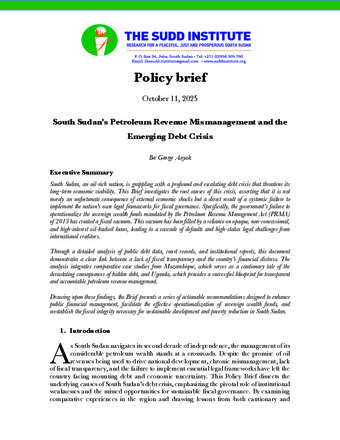
South Sudan's Petroleum Revenue Mismanagement and the Emerging Debt Crisis
Author: Bec George Anyak
Organization: The Sudd Institute
Type: Policy Briefs
Date: 11/10/2025
South Sudan, an oil-rich nation, is grappling with a profound and escalating debt crisis that threatens its long-term economic viability. This Brief investigates the root causes of this crisis, asserting that it is not merely an unfortunate consequence of external economic shocks but a direct result of a systemic failure...
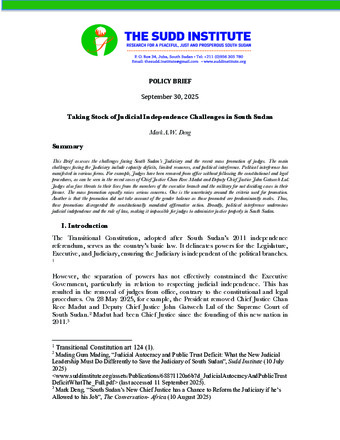
Taking Stock of Judicial Independence Challenges in South Sudan
Author: Mark A. Wek Deng
Type: Policy Briefs
Date: 30/09/2025
This Brief assesses the challenges facing South Sudan’s Judiciary and the recent mass promotion of judges. The main challenges facing the Judiciary include capacity deficits, limited resources, and political interference. Political interference has manifested in various forms. For example, Judges have been removed from office without following the constitutional and...
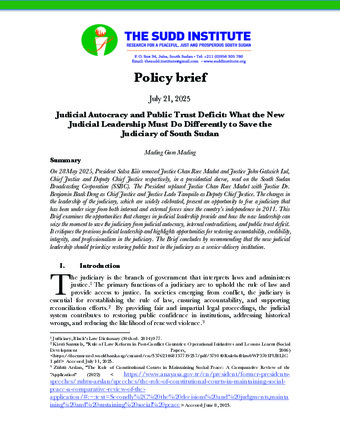
Judicial Autocracy and Public Trust Deficit: What the New Judicial Leadership Must Do Differently to Save the Judiciary of South Sudan
Author: Mading Gum Mading
Type: Policy Briefs
Date: 21/07/2025
On 28 May 2025, President Salva Kiir removed Justice Chan Reec Madut and Justice John Gatwich Lul, Chief Justice and Deputy Chief Justice respectively, in a presidential decree, read on the South Sudan Broadcasting Corporation (SSBC).

Evaluating Trade Dynamics Between the East African Community (EAC) and South Sudan: Economic Opportunities, Challenges, and Strategies for Strengthening Trade Relations
Author: Bec George Anyak
Organization: The Sudd Institute
Type: Policy Briefs
Date: 08/07/2025
This study evaluates the trade dynamics between South Sudan and the East African Community (EAC) by conducting a comprehensive literature review and analyzing secondary data. It focuses on trade deficits, exports performance, Foreign Direct Investment (FDI) inflows, and the impact of Non-Tariff Barriers (NTBs).
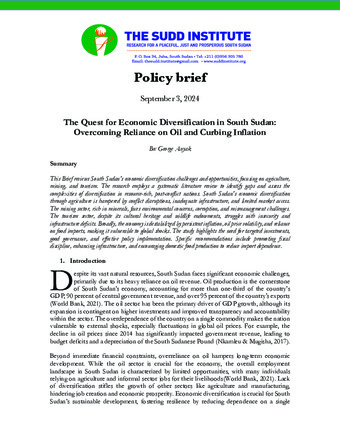
The Quest for Economic Diversification in South Sudan: Overcoming Reliance on Oil and Curbing Inflation
Author: Bec George Anyak
Type: Policy Briefs
Date: 03/09/2024
This Brief reviews South Sudan's economic diversification challenges and opportunities, focusing on agriculture, mining, and tourism. The research employs a systematic literature review to identify gaps and assess the complexities of diversification in resource-rich, post-conflict nations.
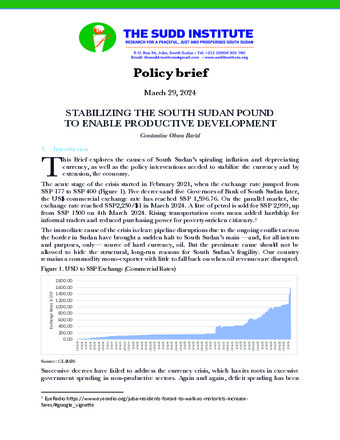
Stabilizing the South Sudan Pound to Enable Productive Development
Author: Constantine Bartel
Type: Policy Briefs
Date: 29/03/2024
This Brief explores the causes of South Sudan’s spiraling inflation and depreciating currency, as well as the policy interventions needed to stabilize the currency and by extension, the economy. The immediate cause of the crisis is clear: pipeline disruptions due to the ongoing conflict across the border in Sudan have...
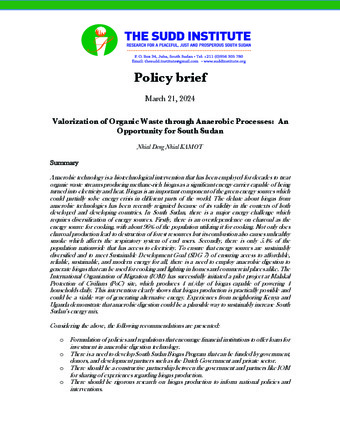
Valorization of Organic Waste through Anaerobic Processes: An Opportunity for South Sudan
Author: Nhial Deng Nhial Kamot
Type: Policy Briefs
Date: 21/03/2024
Anaerobic technology is a biotechnological intervention that has been employed for decades to treat organic waste streams producing methane-rich biogas as a significant energy carrier capable of being turned into electricity and heat. Biogas is an important component of the green energy sources which could partially solve energy crisis in...
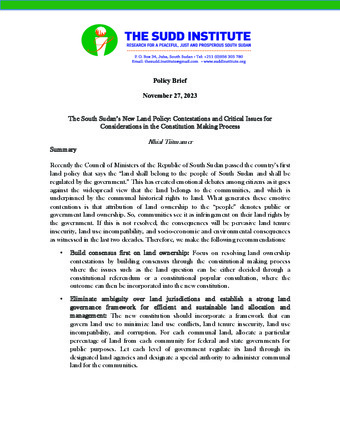
The South Sudan’s New Land Policy: Contestations and Critical Issues for Considerations in the Constitution Making Process
Author: Nhial Tiitmamer
Type: Policy Briefs
Date: 27/11/2023
Recently the Council of Ministers of the Republic of South Sudan passed the country’s first land policy that says the “land shall belong to the people of South Sudan and shall be regulated by the government.” This has created emotional debates and contestations among citizens as it goes against the...
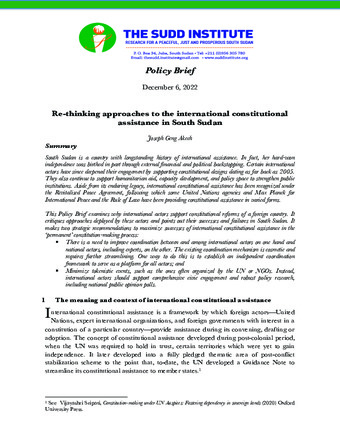
Re-thinking approaches to the international constitutional assistance in South Sudan
Author: Joseph Geng Akech
Type: Policy Briefs
Date: 06/12/2022
South Sudan is a country with longstanding history of international assistance. In fact, her hard-won independence was birthed in part through external financial and political backstopping. Certain international actors have since deepened their engagement by supporting constitutional designs dating as far back as 2005.
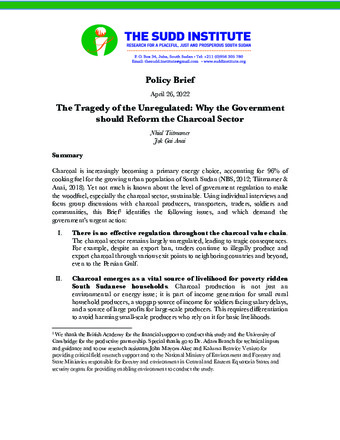
The Tragedy of the Unregulated: Why the Government should Reform the Charcoal Sector
Authors: Jok Gai Anai, Nhial Tiitmamer
Organization: The Sudd Institute
Type: Policy Briefs
Date: 26/04/2022
Charcoal is increasingly becoming a primary energy choice, accounting for 96% of cooking fuel for the growing urban population of South Sudan (NBS, 2012; Tiitmamer & Anai, 2018). Yet not much is known about the level of government regulation to make the woodfuel, especially the charcoal sector, sustainable.
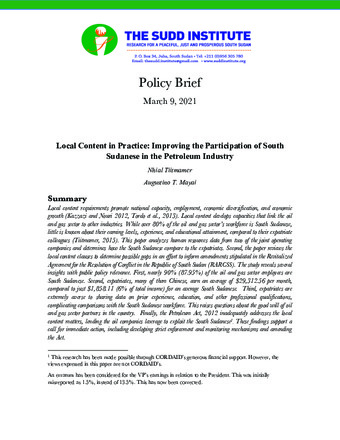
Local Content in Practice: Improving the Participation of South Sudanese in the Petroleum Industry
Authors: Nhial Tiitmamer, Augustino Ting Mayai
Type: Policy Briefs
Date: 09/03/2021
Local content requirements promote national capacity, employment, economic diversification, and economic growth (Kazzazi and Nouri 2012, Tordo et al., 2013). Local content develops capacities that link the oil and gas sector to other industries. While over 80% of the oil and gas sector’s workforce is South Sudanese, little is known...
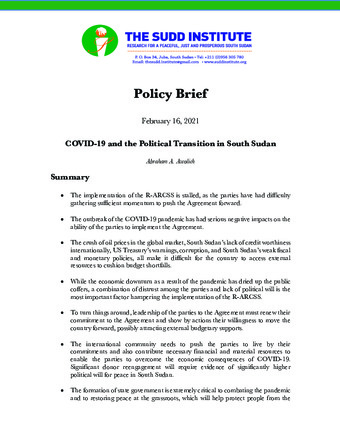
COVID-19 and the Political Transition in South Sudan
Author: Abraham Awolich
Type: Policy Briefs
Date: 16/02/2021
The implementation of the R-ARCSS is stalled, as the parties have had difficulty gathering sufficient momentum to push the Agreement forward. The outbreak of the COVID-19 pandemic has had serious negative impacts on the ability of the parties to implement the Agreement.
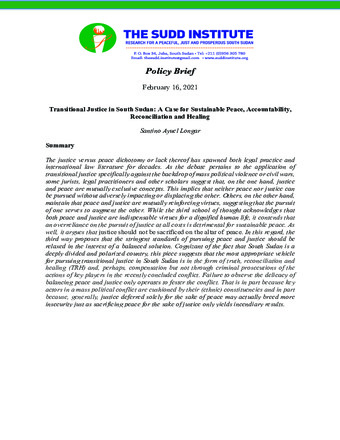
Transitional Justice in South Sudan: A Case for Sustainable Peace, Accountability, Reconciliation and Healing
Author: Santino Ayuel Longar
Type: Policy Briefs
Date: 16/02/2021
The justice versus peace dichotomy or lack thereof has spawned both legal practice and international law literature for decades. As the debate pertains to the application of transitional justice specifically against the backdrop of mass political violence or civil wars, some jurists, legal practitioners and other scholars suggest that, on...
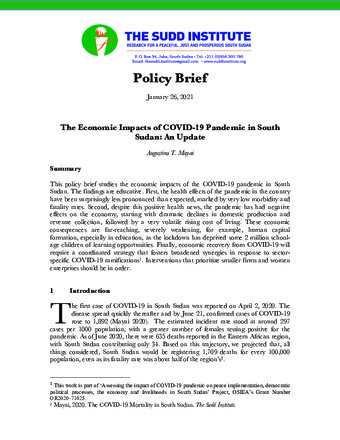
The Economic Impacts of COVID-19 Pandemic in South Sudan: An Update
Author: Augustino Ting Mayai
Organization: The Sudd Institute
Type: Policy Briefs
Date: 26/01/2021
This policy brief studies the economic impacts of the COVID-19 pandemic in South Sudan. The findings are educative. First, the health effects of the pandemic in the country have been surprisingly less pronounced than expected, marked by very low morbidity and fatality rates.
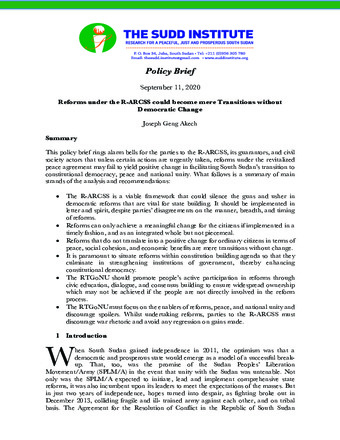
Reforms under the R-ARCSS could become mere Transitions without Democratic Change
Author: Joseph Geng Akech
Organization: The Sudd Institute
Type: Policy Briefs
Date: 11/09/2020
This policy brief rings alarm bells for the parties to the R-ARCSS, its guarantors, and civil society actors that unless certain actions are urgently taken, reforms under the revitalized peace agreement may fail to yield positive change in facilitating South Sudan’s transition to constitutional democracy, peace and national unity.
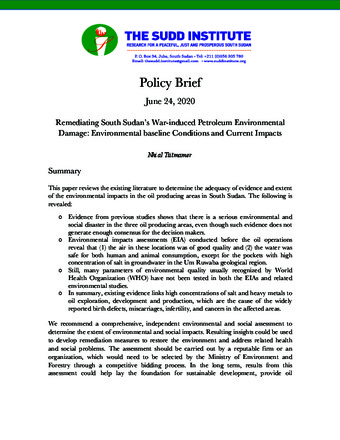
Remediating South Sudan’s War-induced Petroleum Environmental Damage: Environmental baseline Conditions and Current Impacts
Author: Nhial Tiitmamer
Type: Policy Briefs
Date: 24/06/2020
This paper reviews the existing literature to determine the adequacy of evidence and extent of the environmental impacts in the oil producing areas in South Sudan. The following is revealed:
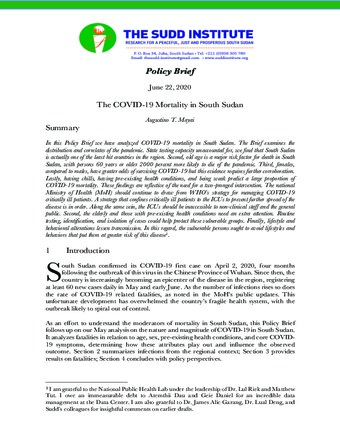
The COVID-19 Mortality in South Sudan
Author: Augustino Ting Mayai
Type: Policy Briefs
Date: 22/06/2020
In this Policy Brief we have analyzed COVID-19 mortality in South Sudan. The Brief examines the distribution and correlates of the pandemic. State testing capacity unaccounted for, we find that South Sudan is actually one of the least hit countries in the region.
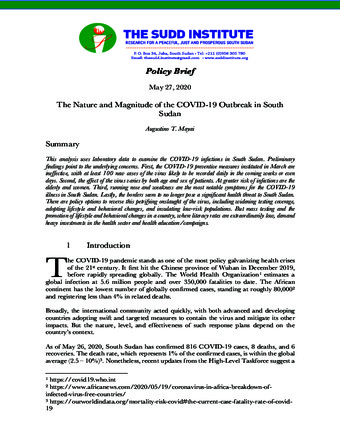
The Nature and Magnitude of the COVID-19 Outbreak in South Sudan
Author: Augustino Ting Mayai
Type: Policy Briefs
Date: 27/05/2020
This analysis uses laboratory data to examine the COVID-19 infections in South Sudan. Preliminary findings point to the underlying concerns. First, the COVID-19 preventive measures instituted in March are ineffective, with at least 100 new cases of the virus likely to be recorded daily in the coming weeks or even days.
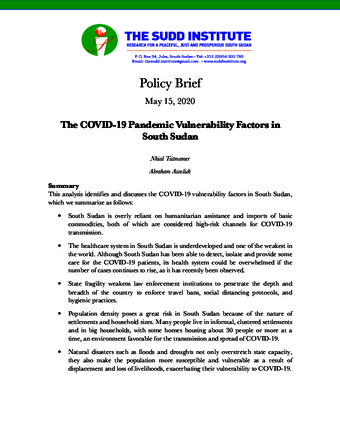
The COVID-19 Pandemic Vulnerability Factors in South Sudan
Authors: Abraham Awolich, Nhial Tiitmamer
Type: Policy Briefs
Date: 15/05/2020
This analysis identifies and discusses the COVID-19 vulnerability factors in South Sudan, summarized as follows:
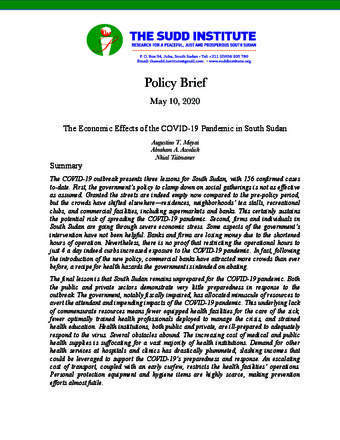
The Economic Effects of the COVID-19 Pandemic in South Sudan
Authors: Abraham Awolich, Nhial Tiitmamer, Augustino Ting Mayai
Type: Policy Briefs
Date: 10/05/2020
The COVID-19 outbreak presents three lessons for South Sudan, with 156 confirmed cases to-date. First, the government’s policy to clamp down on social gatherings is not as effective as assumed. Granted the streets are indeed empty now compared to the pre-policy period, but the crowds have shifted elsewhere—residences, neighborhoods’ tea...
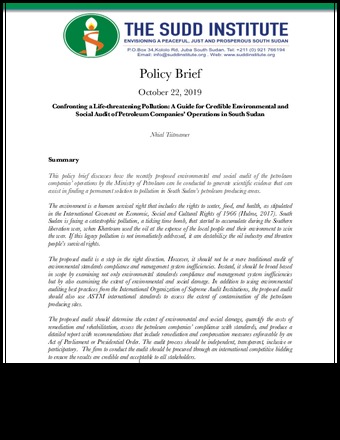
Confronting a Life-threatening Pollution: A Guide for Credible Environmental and Social Audit of Petroleum Companies’ Operations in South Sudan
Author: Nhial Tiitmamer
Organization: The Sudd Institute
Type: Policy Briefs
Date: 04/11/2019
This policy brief discusses how the recently proposed environmental and social audit of the petroleum companies’ operations by the Ministry of Petroleum can be conducted to generate scientific evidence that can assist in finding a permanent solution to pollution in South Sudan’s petroleum producing areas.
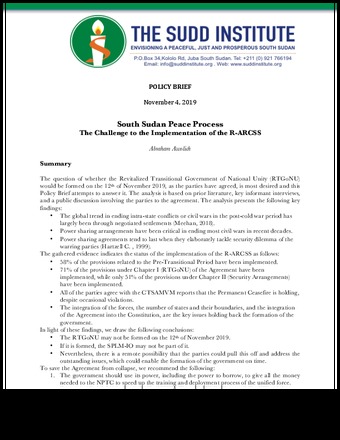
South Sudan Peace Process: The Challenge to the Implementation of the R-ARCSS
Author: Abraham Awolich
Organization: The Sudd Institute
Type: Policy Briefs
Date: 04/11/2019
The question of whether the Revitalized Transitional Government of National Unity (RTGoNU) would be formed on the 12th of November 2019, as the parties have agreed, is most desired and this Policy Brief attempts to answer it.
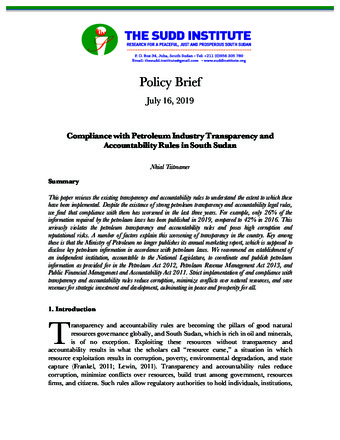
Compliance with Petroleum Industry Transparency and Accountability Rules in South Sudan
Author: Nhial Tiitmamer
Organization: The Sudd Institute
Type: Policy Briefs
Date: 16/07/2019
This paper reviews the existing transparency and accountability rules to understand the extent to which these have been implemented. Despite the existence of strong petroleum transparency and accountability legal rules, we find that compliance with them has worsened in the last three years.
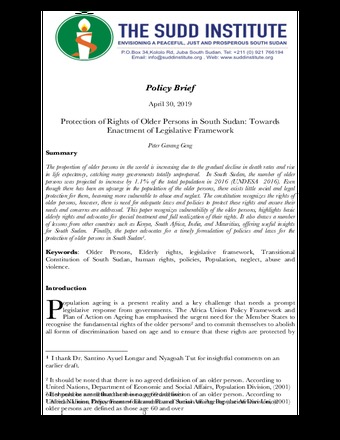
Protection of Rights of Older Persons in South Sudan: Towards Enactment of Legislative Framework
Author: Peter Garang Geng
Organization: The Sudd Institute
Type: Policy Briefs
Date: 06/05/2019
The proportion of older persons in the world is increasing due to the gradual decline in death rates and rise in life expectancy, catching many governments totally unprepared. In South Sudan, the number of older persons was projected to increase by 1.1% of the total population in 2016 (UNDESA 2016).
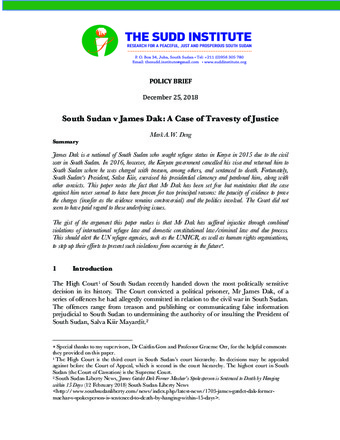
South Sudan v James Dak: A Case of Travesty of Justice
Author: Mark A. Wek Deng
Type: Policy Briefs
Date: 25/12/2018
James Dak is a national of South Sudan who sought refugee status in Kenya in 2015 due to the civil war in South Sudan. In 2016, however, the Kenyan government cancelled his visa and returned him to South Sudan where he was charged with treason, among others, and sentenced to death.
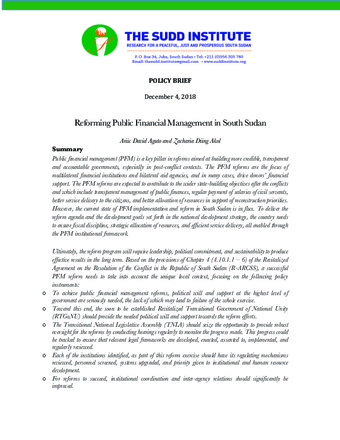
Reforming Public Financial Management in South Sudan
Author: Ariic David Aguto Reng
Type: Policy Briefs
Date: 04/12/2018
Public financial management (PFM) is a key pillar in reforms aimed at building more credible, transparent and accountable governments, especially in post-conflict contexts. The PFM reforms are the focus of multilateral financial institutions and bilateral aid agencies, and in many cases, drive donors’ financial support.
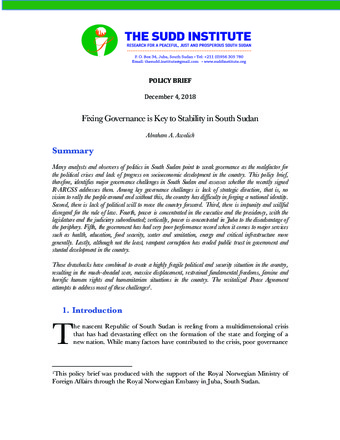
Fixing Governance is Key to Stability in South Sudan
Author: Abraham Awolich
Organization: The Sudd Institute
Type: Policy Briefs
Date: 04/12/2018
Many analysts and observers of politics in South Sudan point to weak governance as the malefactor for the political crises and lack of progress on socio-economic development in the country. This policy brief, therefore, identifies major governance challenges in South Sudan and assesses whether the recently signed R-ARCSS addresses them.
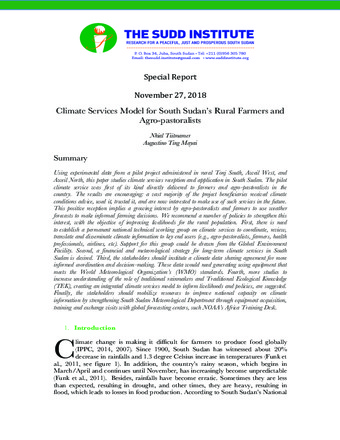
Climate Services Model for South Sudan’s Rural Farmers and Agro-pastoralists
Authors: Nhial Tiitmamer, Augustino Ting Mayai
Type: Policy Briefs
Date: 27/11/2018
Using experimental data from a pilot project administered in rural Tonj South, Aweil West, and Aweil North, this paper studies climate services reception and application in South Sudan. The pilot climate service was first of its kind directly delivered to farmers and agro-pastoralists in the country.
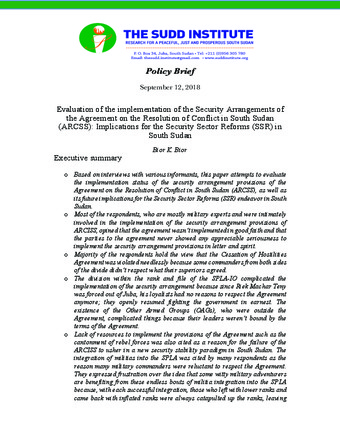
Evaluation of the implementation of the Security Arrangements of the Agreement on the Resolution of Conflict in South Sudan (ARCSS): Implications for the Security Sector Reforms (SSR) in South Sudan
Author: Bior K. Bior
Type: Policy Briefs
Date: 12/09/2018
Based on interviews with various informants, this paper attempts to evaluate the implementation status of the security arrangement provisions of the Agreement on the Resolution of Conflict in South Sudan (ARCSS), as well as its future implications for the Security Sector Reforms (SSR) endeavor in South Sudan.
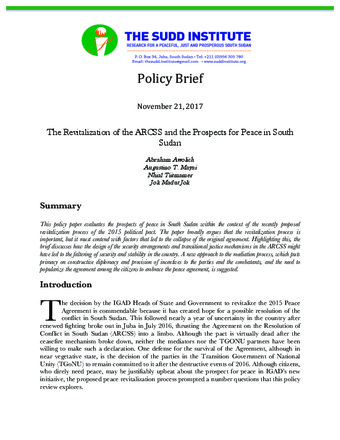
The Revitalization of the ARCSS and the Prospects for Peace in South Sudan
Authors: Abraham Awolich, Jok Madut Jok, Nhial Tiitmamer, Augustino Ting Mayai
Type: Policy Briefs
Date: 21/11/2017
This policy paper evaluates the prospects of peace in South Sudan within the context of the recently proposed revitalization process of the 2015 political pact. The paper broadly argues that the revitalization process is important, but it must contend with factors that led to the collapse of the original agreement.
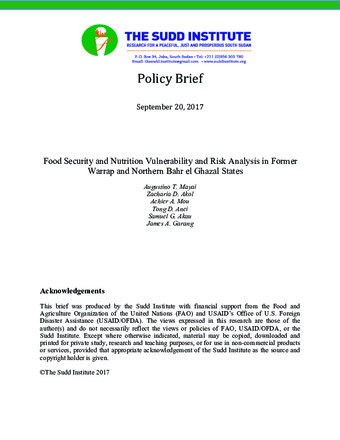
Food Security and Nutrition Vulnerability and Risk Analysis in Former Warrap and Northern Bahr el Ghazal States
Authors: Samuel Garang Akau, Augustino Ting Mayai
Type: Policy Briefs
Date: 20/09/2017
Despite no direct politically driven armed conflict in former Northern Bahr el Ghazal and Warrap States, assessments have shown deteriorating food security and nutritional conditions. More generally, the Integrated Food Security Phase Classification (IPC) shows a growing food security problem in South Sudan, with a large proportion of people sliding...
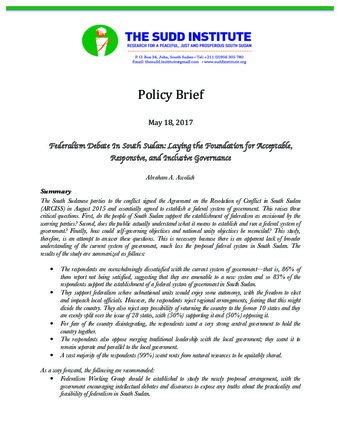
Federalism Debate In South Sudan: Laying the Foundation for Acceptable, Responsive, and Inclusive Governance
Author: Abraham Awolich
Type: Policy Briefs
Date: 18/05/2017
The South Sudanese parties to the conflict signed the Agreement on the Resolution of Conflict in South Sudan (ARCISS) in August 2015 and essentially agreed to establish a federal system of government. This raises three critical questions.
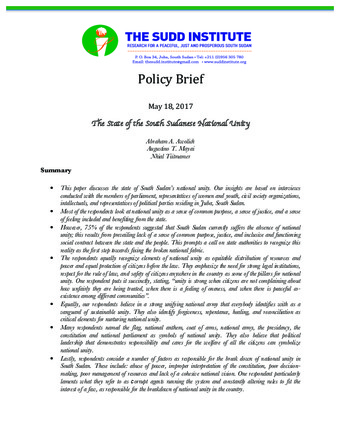
The State of the South Sudanese National Unity
Authors: Abraham Awolich, Nhial Tiitmamer, Augustino Ting Mayai
Type: Policy Briefs
Date: 18/05/2017
This paper discusses the state of South Sudan’s national unity. Our insights are based on interviews conducted with members of parliament, representatives of women and youth, civil society organizations, intellectuals, and representatives of political parties residing in Juba, South Sudan.
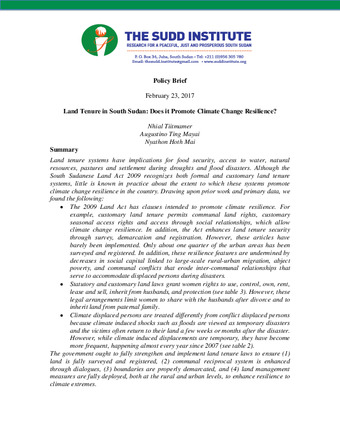
Land Tenure in South Sudan: Does it Promote Climate Change Resilience?
Authors: Nyathon Hoth Mai, Nhial Tiitmamer, Augustino Ting Mayai
Organization: The Sudd Institute
Type: Policy Briefs
Date: 01/03/2017
Land tenure systems have implications for food security, access to water, natural resources, pastures and settlement during droughts and flood disasters. Although the South Sudanese Land Act 2009 recognizes both formal and customary land tenure systems, little is known in practice about the extent to which these systems promote climate...
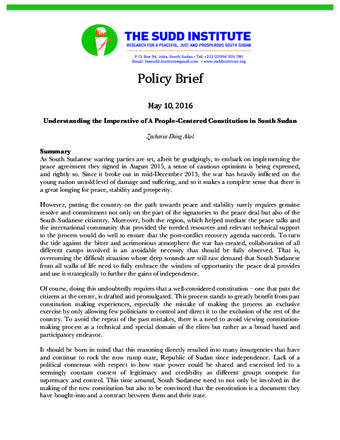
Understanding the Imperative of A People-Centered Constitution in South Sudan
Organization: The Sudd Institute
Type: Policy Briefs
Date: 14/11/2016
As South Sudanese warring parties are set, albeit be grudgingly, to embark on implementing the peace agreement they signed in August 2015, a sense of cautious optimism is being expressed, and rightly so. Since it broke out in mid-December 2013, the war has heavily inflicted on the young nation...
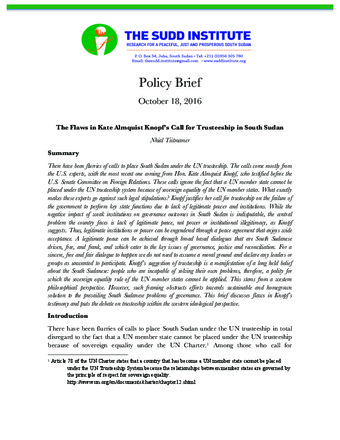
The Flaws in Kate Almquist Knopf’s Call for Trusteeship in South Sudan
Author: Nhial Tiitmamer
Organization: The Sudd Institute
Type: Policy Briefs
Date: 20/10/2016
There have been flurries of calls to place South Sudan under the UN trusteeship. The calls come mostly from the U.S. experts, with the most recent one coming from Hon. Kate Almquist Knopf, who testified before the U.S. Senate Committee on Foreign Relations.
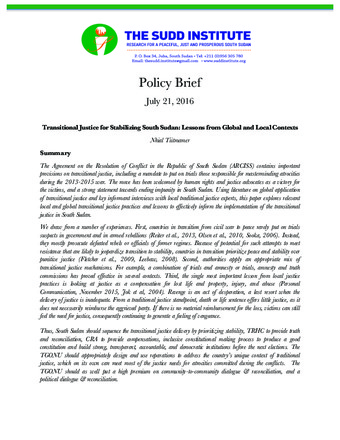
Transitional Justice for Stabilizing South Sudan: Lessons from Global and Local Contexts
Author: Nhial Tiitmamer
Organization: The Sudd Institute
Type: Policy Briefs
Date: 21/07/2016
The Agreement on the Resolution of Conflict in the Republic of South Sudan (ARCISS) contains important provisions on transitional justice, including a mandate to put on trials those responsible for masterminding atrocities during the 2013-2015 war.
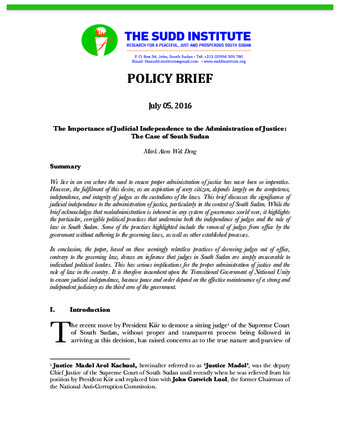
The Importance of Judicial Independence to the Administration of Justice: The Case of South Sudan
Author: Mark A. Wek Deng
Organization: The Sudd Institute
Type: Policy Briefs
Date: 05/07/2016
We live in an era where the need to ensure proper administration of justice has never been so imperative. However, the fulfilment of this desire, as an aspiration of every citizen, depends largely on the competence, independence, and integrity of judges as the custodians of the laws.
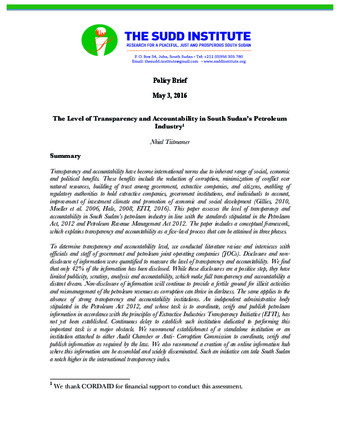
Transparency and Accountability in South Sudan’s Petroleum Industry
Author: Nhial Tiitmamer
Organization: The Sudd Institute
Type: Policy Briefs
Date: 03/05/2016
Transparency and accountability have become international norms due to inherent range of social, economic and political benefits. These benefits include the reduction of corruption, minimization of conflict over natural resources, building of trust among government, extractive companies, and citizens, enabling of regulatory authorities to hold extractive companies, government institutions, and...
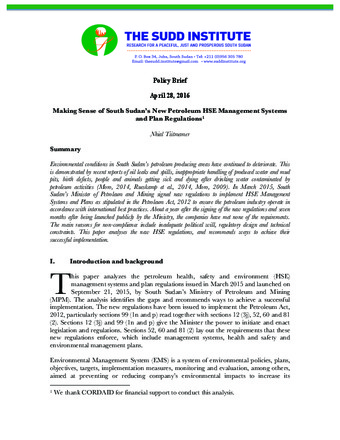
Making Sense of South Sudan’s New Petroleum HSE Management Systems and Plan Regulations
Author: Nhial Tiitmamer
Organization: The Sudd Institute
Type: Policy Briefs
Date: 28/04/2016
Environmental conditions in South Sudan’s petroleum producing areas have continued to deteriorate. This is demonstrated by recent reports of oil leaks and spills, inappropriate handling of produced water and mud pits, birth defects, people and animals getting sick and dying after drinking water contaminated by petroleum activities (Moro, 2014, Rueskamp...
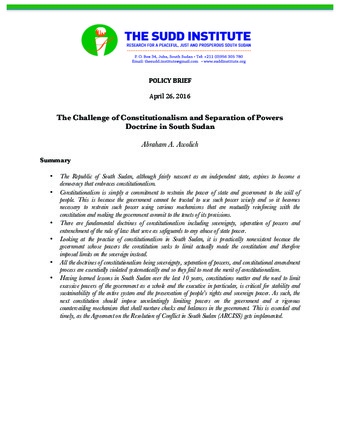
The Challenge of Constitutionalism and Separation of Powers Doctrine in South Sudan
Author: Abraham Awolich
Organization: The Sudd Institute
Type: Policy Briefs
Date: 26/04/2016
The Republic of South Sudan, although fairly nascent as an independent state, aspires to become a democracy that embraces constitutionalism. Constitutionalism is simply a commitment to restrain the power of state and government to the will of people.
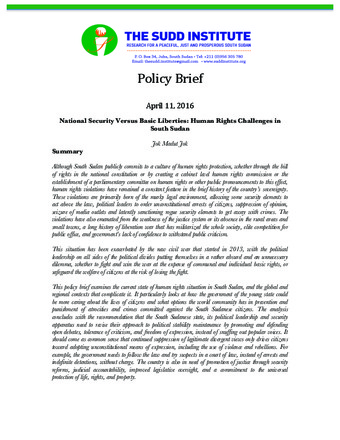
National Security Versus Basic Liberties: Human Rights Challenges in South Sudan
Author: Jok Madut Jok
Organization: The Sudd Institute
Type: Policy Briefs
Date: 11/04/2016
Although South Sudan publicly commits to a culture of human rights protection, whether through the bill of rights in the national constitution or by creating a cabinet level human rights commission or the establishment of a parliamentary committee on human rights or other public pronouncements to this effect, human rights...
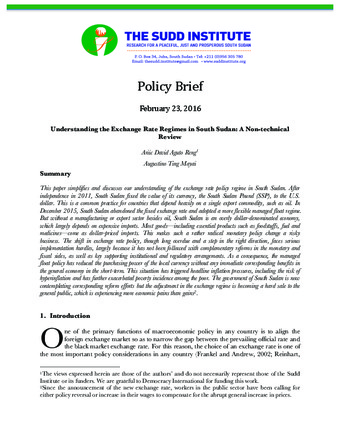
Understanding the Exchange Rate Regimes in South Sudan: A Non-technical Review
Authors: Ariic David Aguto Reng, Augustino Ting Mayai
Organization: The Sudd Institute
Type: Policy Briefs
Date: 23/02/2016
This paper simplifies and discusses our understanding of the exchange rate policy regime in South Sudan. After independence in 2011, South Sudan fixed the value of its currency, the South Sudan Pound (SSP), to the U.S. dollar.
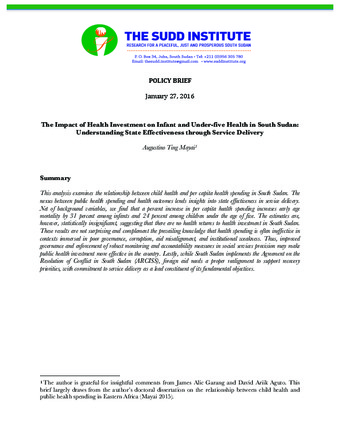
The Impact of Health Investment on Infant and Under-five Health in South Sudan: Understanding State Effectiveness through Service Delivery
Author: Augustino Ting Mayai
Organization: The Sudd Institute
Type: Policy Briefs
Date: 27/01/2016
This analysis examines the relationship between child health and per capita health spending in South Sudan. The nexus between public health spending and health outcomes lends insights into state effectiveness in service delivery. Net of background variables, we find that a percent increase in per capita health spending increases early...
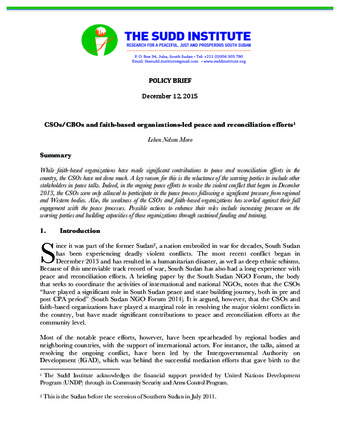
CSOs/CBOs and faith-based organizations-led peace and reconciliation efforts
Author: Leben Nelson Moro
Organization: The Sudd Institute
Type: Policy Briefs
Date: 12/12/2015
While faith-based organizations have made significant contributions to peace and reconciliation efforts in the country, the CSOs have not done much. A key reason for this is the reluctance of the warring parties to include other stakeholders in peace talks.
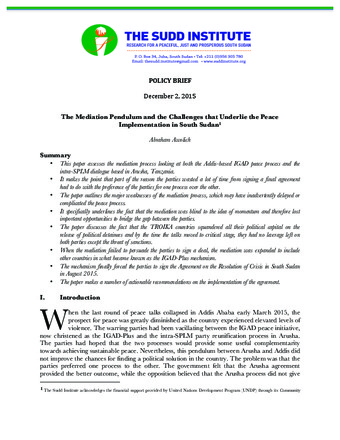
The Mediation Pendulum and the Challenges that Underlie the Peace Implementation in South Sudan
Author: Abraham Awolich
Organization: The Sudd Institute
Type: Policy Briefs
Date: 02/12/2015
This paper assesses the mediation process looking at both the Addis-based IGAD peace process and the intra-SPLM dialogue based in Arusha, Tanzania. It makes the point that part of the reason the parties wasted a lot of time from signing a final agreement had to do with the preference of...
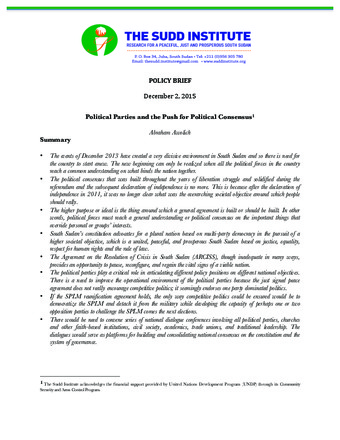
Political Parties and the Push for Political Consensus
Author: Abraham Awolich
Organization: The Sudd Institute
Type: Policy Briefs
Date: 02/12/2015
The events of December 2013 have created a very divisive environment in South Sudan and so there is need for the country to start anew. The new beginning can only be realized when all the political forces in the country reach a common understanding on what binds the nation together.
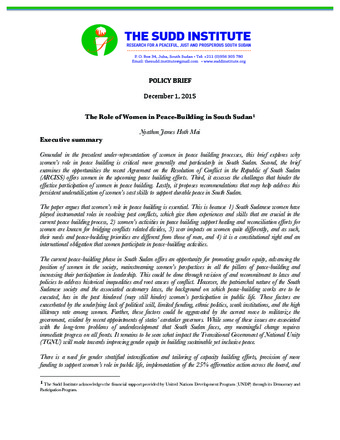
The Role of Women in Peace-Building in South Sudan
Author: Nyathon Hoth Mai
Organization: The Sudd Institute
Type: Policy Briefs
Date: 01/12/2015
Grounded in the prevalent under-representation of women in peace-building processes, this brief explores why women’s role in peace-building is critical more generally and particularly in South Sudan. Second, the brief examines the opportunities the recent Agreement on the Resolution of Conflict in the Republic of South Sudan (ARCISS) offers women...
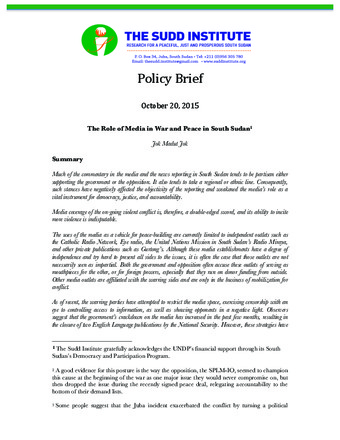
The Role of Media in War and Peace in South Sudan
Author: Jok Madut Jok
Organization: The Sudd Institute
Type: Policy Briefs
Date: 20/10/2015
Much of the commentary in the media and the news reporting in South Sudan tends to be partisan either supporting the government or the opposition. It also tends to take a regional or ethnic line. Consequently, such stances have negatively affected the objectivity of the reporting and weakened the media’s...
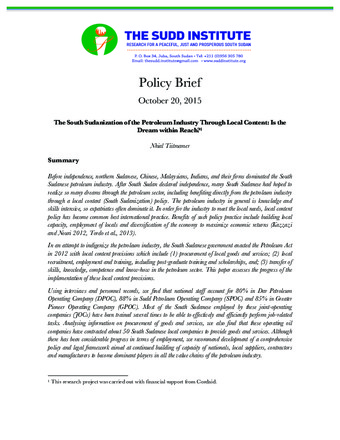
The South Sudanization of the Petroleum Industry Through Local Content: Is the Dream within Reach?
Author: Nhial Tiitmamer
Organization: The Sudd Institute
Type: Policy Briefs
Date: 20/10/2015
Before independence, northern Sudanese, Chinese, Malaysians, Indians, and their firms dominated the South Sudanese petroleum industry. After South Sudan declared independence, many South Sudanese had hoped to realize so many dreams through the petroleum sector, including benefiting directly from the petroleum industry through a local content (South Sudanization) policy.
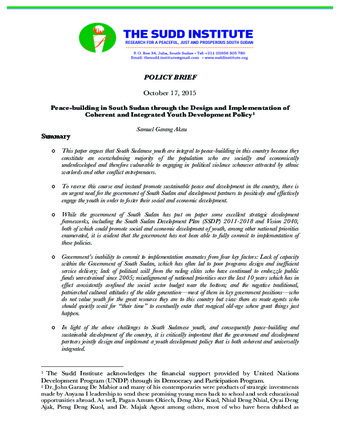
Peace-building in South Sudan through the Design and Implementation of Coherent and Integrated Youth Development Policy
Author: Samuel Garang Akau
Organization: The Sudd Institute
Type: Policy Briefs
Date: 17/10/2015
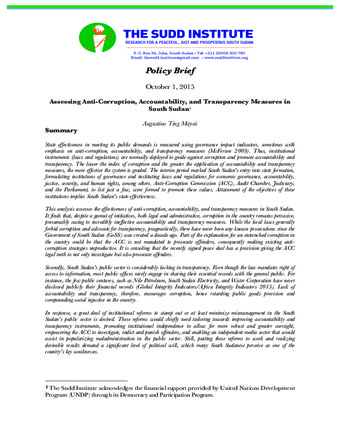
Assessing Anti-Corruption, Accountability, and Transparency Measures in South Sudan
Author: Augustino Ting Mayai
Organization: The Sudd Institute
Type: Policy Briefs
Date: 01/10/2015
State effectiveness in meeting its public demands is measured using governance impact indicators, sometimes with emphasis on anti-corruption, accountability, and transparency measures (McFerson 2009). Thus, institutional instruments (laws and regulations) are normally deployed to guide against corruption and promote accountability and transparency.
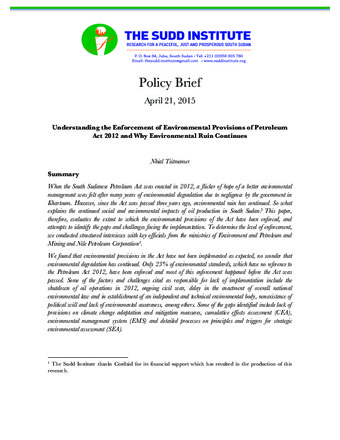
Understanding the Enforcement of Environmental Provisions of Petroleum Act, 2012 and Why Environmental Ruin Continues
Author: Nhial Tiitmamer
Organization: The Sudd Institute
Type: Policy Briefs
Date: 21/04/2015
When the South Sudanese Petroleum Act was enacted in 2012, a flicker of hope of a better environmental management was felt after many years of environmental degradation due to negligence by the government in Khartoum. However, since the Act was passed three years ago, environmental ruin has continued.
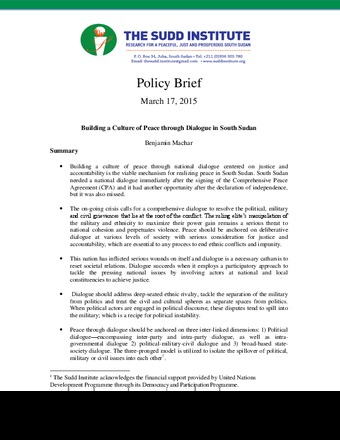
Building a Culture of Peace through Dialogue in South Sudan
Author: Benjamin A. Machar
Organization: The Sudd Institute
Type: Policy Briefs
Date: 17/03/2015
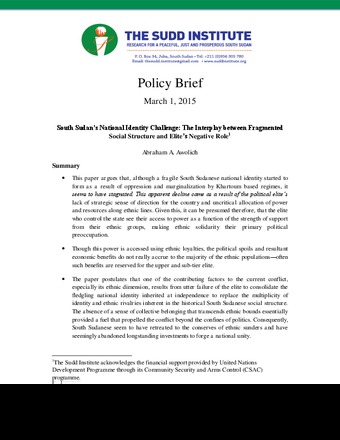
South Sudan’s National Identity Challenge: The Interplay between Fragmented Social Structure and Elite's Negative Role
Author: Abraham Awolich
Organization: The Sudd Institute
Type: Policy Briefs
Date: 01/03/2015
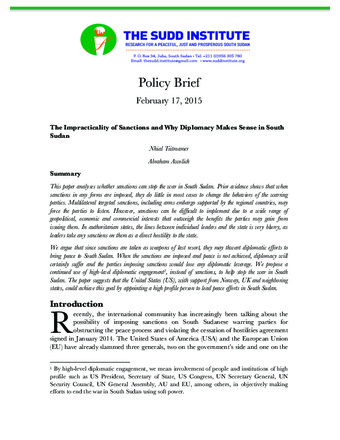
The Impracticality of Sanctions and Why Diplomacy Makes Sense in South Sudan
Authors: Abraham Awolich, Nhial Tiitmamer
Organization: The Sudd Institute
Type: Policy Briefs
Date: 17/02/2015
This paper analyses whether sanctions can stop the war in South Sudan. Prior evidence shows that when sanctions in any forms are imposed, they do little in most cases to change the behaviors of the warring parties.
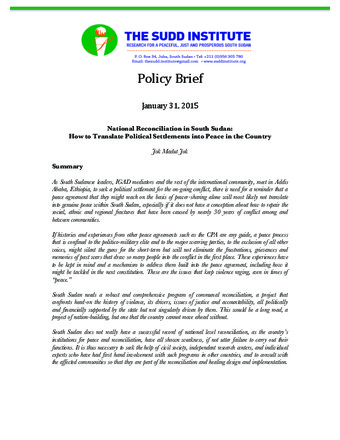
National Reconciliation in South Sudan: How to Translate Political Settlements into Peace in the Country
Author: Jok Madut Jok
Organization: The Sudd Institute
Type: Policy Briefs
Date: 31/01/2015
As South Sudanese leaders, IGAD mediators and the rest of the international community, meet in Addis Ababa, Ethiopia, to seek a political settlement for the on-going conflict, there is need for a reminder that a peace agreement that they might reach on the basis of power-sharing alone will most likely...
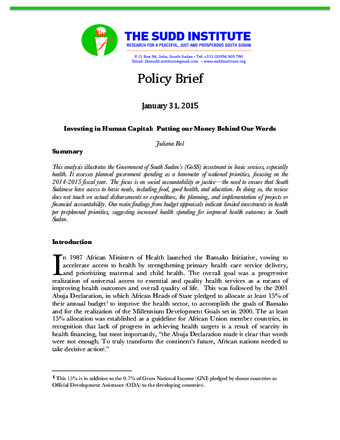
Investing in Human Capital: Putting our Money Behind Our Words
Author: Juliana Bol
Organization: The Sudd Institute
Type: Policy Briefs
Date: 31/01/2015
This analysis illustrates the Government of South Sudan’s (GoSS) investment in basic services, especially health. It assesses planned government spending as a barometer of national priorities, focusing on the 2014-2015 fiscal year. The focus is on social accountability or justice—the need to ensure that South Sudanese have access to basic...
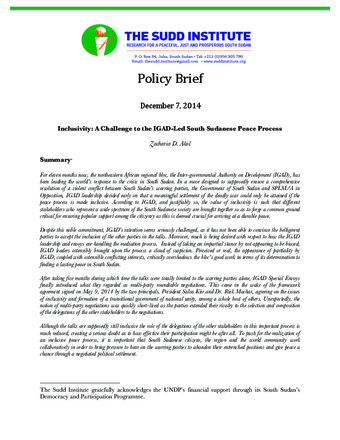
Inclusivity: A Challenge to the IGAD-Led South Sudanese Peace Process
Organization: The Sudd Institute
Type: Policy Briefs
Date: 07/12/2014
For eleven months now, the northeastern African regional bloc, the Inter-governmental Authority on Development (IGAD), has been leading the world’s response to the crisis in South Sudan. In a move designed to supposedly ensure a comprehensive resolution of a violent conflict between South Sudan’s warring parties, the Government of South...
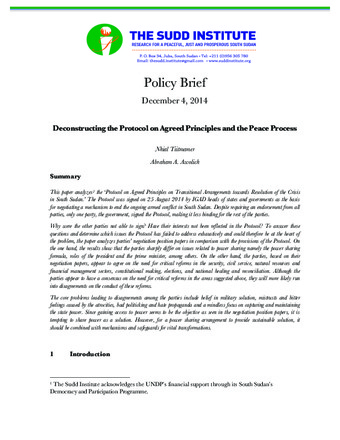
Deconstructing the Protocol on Agreed Principles and the Peace Process
Authors: Abraham Awolich, Nhial Tiitmamer
Organization: The Sudd Institute
Type: Policy Briefs
Date: 04/12/2014
This paper analyzes the ‘Protocol on Agreed Principles on Transitional Arrangements towards Resolution of the Crisis in South Sudan.’ The Protocol was signed on 25 August 2014 by IGAD heads of states and governments as the basis for negotiating a mechanism to end the ongoing armed conflict in South Sudan.
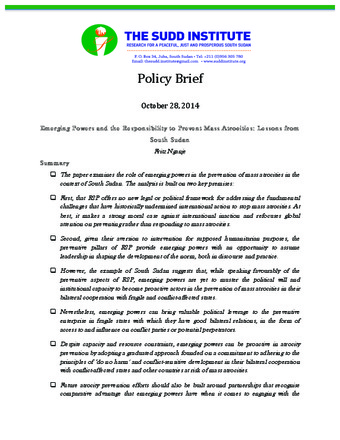
Emerging Powers and the Responsibility to Prevent Mass Atrocities: Lessons from South Sudan
Author: Fritz Nganje
Organization: The Sudd Institute
Type: Policy Briefs
Date: 28/10/2014
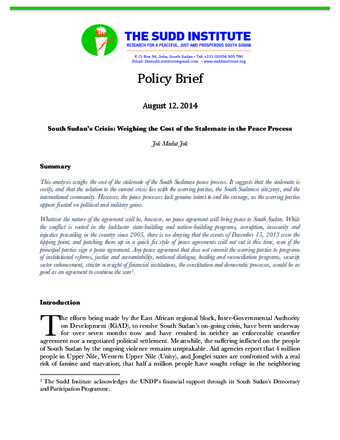
South Sudan’s Crisis: Weighing the Cost of the Stalemate in the Peace Process
Author: Jok Madut Jok
Organization: The Sudd Institute
Type: Policy Briefs
Date: 12/08/2014
This analysis weighs the cost of the stalemate of the South Sudanese peace process. It suggests that the stalemate is costly, and that the solution to the current crisis lies with the warring parties, the South Sudanese citizenry, and the international community.
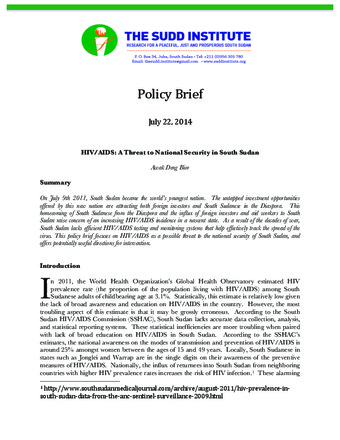
HIV/AIDS: A Threat to National Security in South Sudan
Author: Awak Deng Bior
Organization: The Sudd Institute
Type: Policy Briefs
Date: 22/07/2014
On July 9th 2011, South Sudan became the world’s youngest nation. The untapped investment opportunities offered by this new nation are attracting both foreign investors and South Sudanese in the Diaspora. This homecoming of South Sudanese from the Diaspora and the influx of foreign investors and aid workers to South...
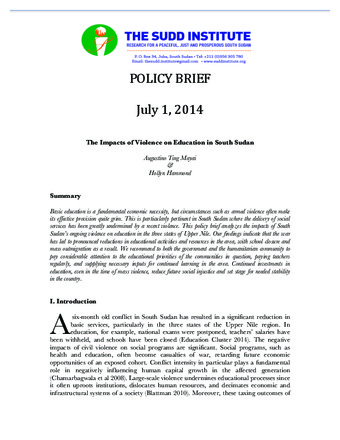
The Impacts of Violence on Education in South Sudan
Authors: Hollyn Hammond, Augustino Ting Mayai
Organization: The Sudd Institute
Type: Policy Briefs
Date: 01/07/2014
Keyword(s): Education, South Sudan, Violence, Impacts
Basic education is a fundamental economic necessity, but circumstances such as armed violence often make its effective provision quite grim. This is particularly pertinent in South Sudan where the delivery of social services has been greatly undermined by a recent violence.
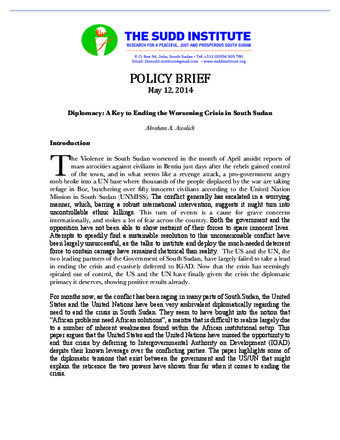
Diplomacy: A Key to Ending the Worsening Crisis in South Sudan
Author: Abraham Awolich
Organization: The Sudd Institute
Type: Policy Briefs
Date: 12/05/2014
The Violence in South Sudan worsened in the month of April amidst reports of mass atrocities against civilians in Bentiu just days after the rebels gained control of the town, and in what seems like a revenge attack, a pro-government angry mob broke into a UN base where thousands of...
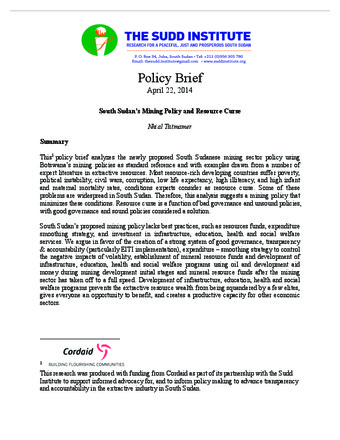
South Sudan’s Mining Policy and Resource Curse
Author: Nhial Tiitmamer
Organization: The Sudd Institute
Type: Policy Briefs
Date: 22/04/2014
This policy brief analyzes the newly proposed South Sudanese mining sector policy using Botswana’s mining policies as standard reference and with examples drawn from a number of expert literature in extractive resources. Most resource-rich developing countries suffer poverty, political instability, civil wars, corruption, low life expectancy, high illiteracy, and high...
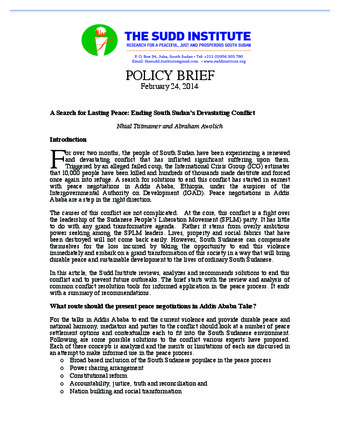
A Search for Lasting Peace: Ending South Sudan’s Devastating Conflict
Authors: Abraham Awolich, Nhial Tiitmamer
Organization: The Sudd Institute
Type: Policy Briefs
Date: 24/02/2014
For over two months, the people of South Sudan have been experiencing a renewed and devastating conflict that has inflicted significant suffering upon them. Triggered by an alleged failed coup, the International Crisis Group (ICG) estimates that 10,000 people have been killed and hundreds of thousands made destitute and forced...
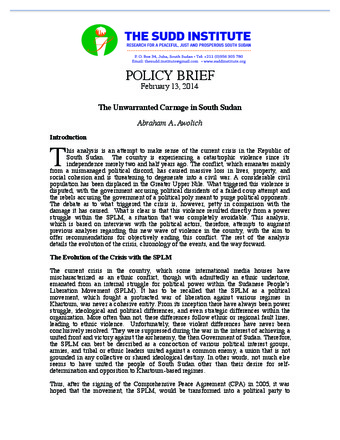
The Unwarranted Carnage in South Sudan
Author: Abraham Awolich
Organization: The Sudd Institute
Type: Policy Briefs
Date: 13/02/2014
This analysis is an attempt to make sense of the current crisis in the Republic of South Sudan. The country is experiencing a catastrophic violence since its independence merely two and half years ago. The conflict, which emanates mainly from a mismanaged political discord, has caused massive loss in lives,...
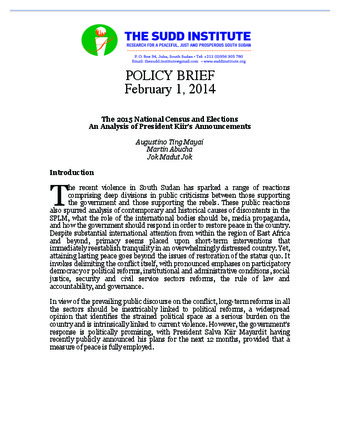
The 2015 National Census and Elections: An Analysis of President Kiir’s Announcements
Authors: Martin Abucha, Jok Madut Jok, Augustino Ting Mayai
Organization: The Sudd Institute
Type: Policy Briefs
Date: 01/02/2014
The recent violence in South Sudan has sparked a range of reactions comprising deep divisions in public criticisms between those supporting the government and those supporting the rebels. These public reactions also spurred analysis of contemporary and historical causes of discontents in the SPLM, what the role of the international...
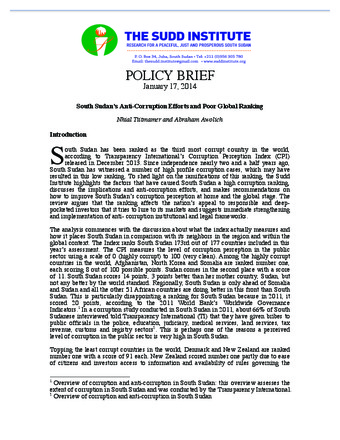
South Sudan’s Anti-Corruption Efforts and Poor Global Ranking
Authors: Abraham Awolich, Nhial Tiitmamer
Organization: The Sudd Institute
Type: Policy Briefs
Date: 17/01/2014
South Sudan has been ranked as the third most corrupt country in the world, according to Transparency International’s Corruption Perception Index (CPI) released in December 2013. Since independence nearly two and a half years ago, South Sudan has witnessed a number of high profile corruption cases, which may have resulted...
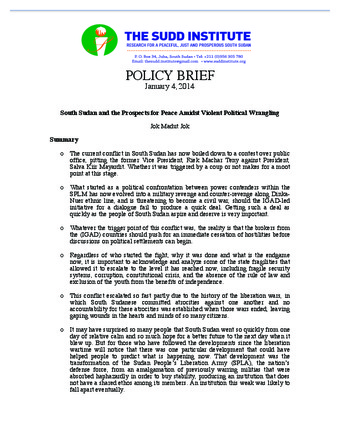
South Sudan and the Prospects for Peace Amidst Violent Political Wrangling
Author: Jok Madut Jok
Organization: The Sudd Institute
Type: Policy Briefs
Date: 04/01/2014
The unfolding unrest in South Sudan, beginning with the events of December 15th, 2013 in Juba when fighting broke out within the presidential guard and had spread to Greater Upper Nile within two days, may not have been exactly predictable, but it was not entirely surprising.
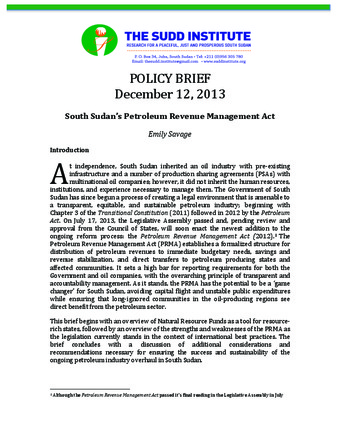
South Sudan’s Petroleum Revenue Management Act
Author: Emily Savage
Organization: The Sudd Institute
Type: Policy Briefs
Date: 12/12/2013
At independence, South Sudan inherited an oil industry with pre-existing infrastructure and a number of production sharing agreements (PSAs) with multinational oil companies; however, it did not inherit the human resources, institutions, and experience necessary to manage them.
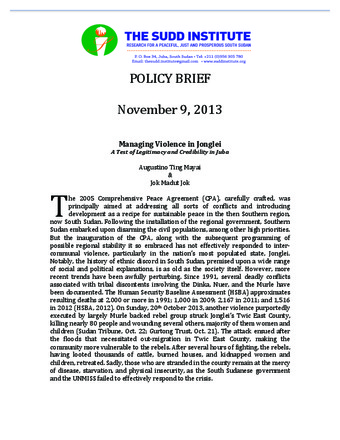
Managing Violence in Jonglei: A Test of Legitimacy and Credibility in Juba
Authors: Jok Madut Jok, Augustino Ting Mayai
Organization: The Sudd Institute
Type: Policy Briefs
Date: 09/11/2013
The Human Security Baseline Assessment (HSBA) approximates resulting deaths at 2,000 or more in 1991; 1,000 in 2009; 2,167 in 2011; and 1,516 in 2012 (HSBA, 2012). On Sunday, 20th October 2013, another violence purportedly executed by largely Murle backed rebel group struck Jonglei’s Twic East County, killing nearly 80...
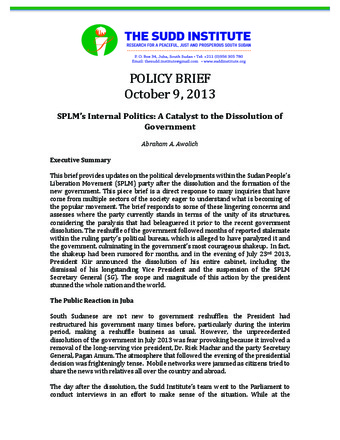
SPLM’s Internal Politics: A Catalyst to the Dissolution of Government
Author: Abraham Awolich
Organization: The Sudd Institute
Type: Policy Briefs
Date: 09/10/2013
This brief provides updates on the political developments within the Sudan People’s Liberation Movement (SPLM) party after the dissolution and the formation of the new government. This piece brief is a direct response to many inquiries that have come from multiple sectors of the society eager to understand what is...
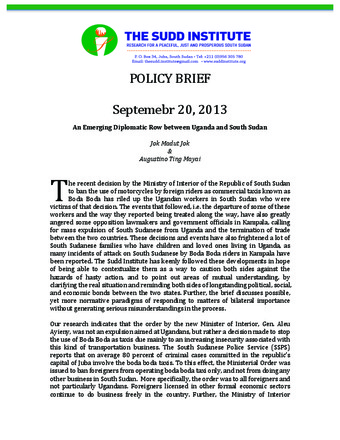
An Emerging Diplomatic Row between Uganda and South Sudan
Authors: Jok Madut Jok, Augustino Ting Mayai
Organization: The Sudd Institute
Type: Policy Briefs
Date: 20/09/2013
The recent decision by the Ministry of Interior of the Republic of South Sudan to ban the use of motorcycles by foreign riders as commercial taxis known as Boda Boda has riled up the Ugandan workers in South Sudan who were victims of that decision. The events that followed, i.e.
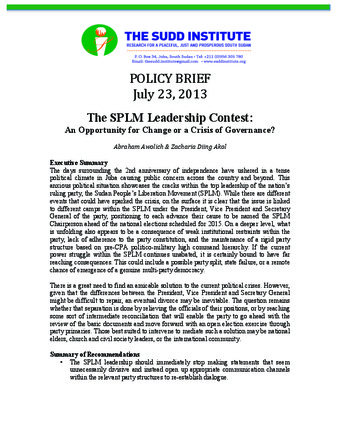
SPLM Leadership Contest
Author: Abraham Awolich
Organization: The Sudd Institute
Type: Policy Briefs
Date: 23/07/2013
The days surrounding the 2nd anniversary of independence have ushered in a tense political climate in Juba causing public concern across the country and beyond. This anxious political situation showcases the cracks within the top leadership of the nation’s ruling party, the Sudan People’s Liberation Movement (SPLM).
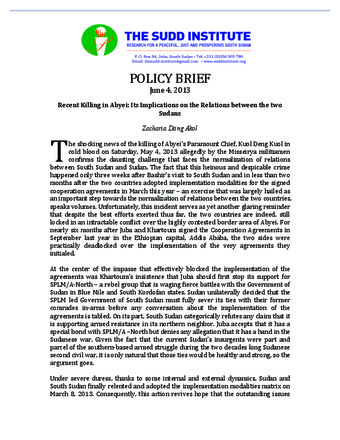
Recent Killing in Abyei: Its Implications on the Relations between the two Sudans
Organization: The Sudd Institute
Type: Policy Briefs
Date: 04/06/2013
The shocking news of the killing of Abyei’s Paramount Chief, Kuol Deng Kuol in cold blood on Saturday, May 4, 2013 allegedly by the Misseirya militiamen confirms the daunting challenge that faces the normalization of relations between South Sudan and Sudan.
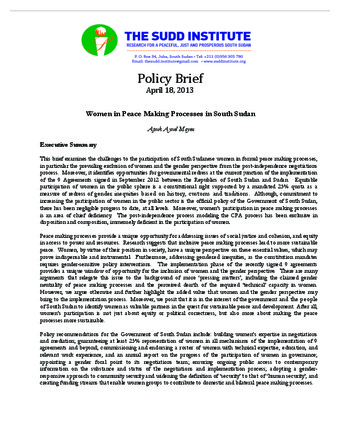
Women in Peace Making Processes in South Sudan
Author: Apuk Ayuel Mayen
Organization: The Sudd Institute
Type: Policy Briefs
Date: 18/04/2013
This brief examines the challenges to the participation of South Sudanese women in formal peace making processes, in particular the prevailing exclusion of women and the gender perspective from the post-independence negotiations process. Moreover, it identifies opportunities for governmental redress at the current junction of the implementation of the 9...
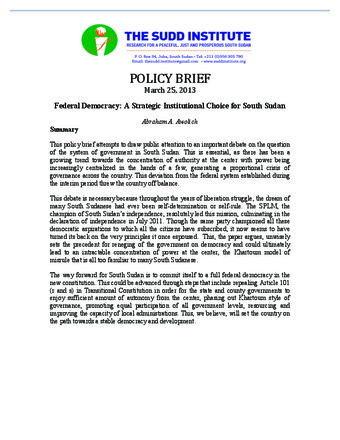
Federal Democracy: A Strategic Institutional Choice for South Sudan
Author: Abraham Awolich
Organization: The Sudd Institute
Type: Policy Briefs
Date: 25/03/2013
This policy brief attempts to draw public attention to an important debate on the question of the system of government in South Sudan. This is essential, as there has been a growing trend towards the concentration of authority at the center with power being increasingly centralized in the hands of...
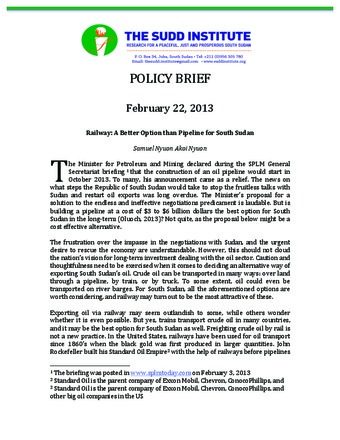
Railway: A Better Option than Pipeline for South Sudan
Author: Samuel Nyuon Akoi Nyuon
Organization: The Sudd Institute
Type: Policy Briefs
Date: 22/02/2013
The frustration over the impasse in the negotiations with Sudan, and the urgent desire to rescue the economy are understandable. However, this should not cloud the nation’s vision for long-term investment dealing with the oil sector.
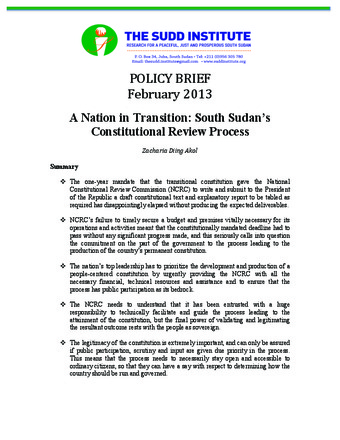
A Nation in Transition: South Sudan’s Constitutional Review Process
Organization: The Sudd Institute
Type: Policy Briefs
Date: 17/02/2013
One year after the decree issued by the president of the Republic of South Sudan effectively forming the National Constitution Review Commission, little is known about the progress towards writing the permanent constitution for the world's newest nation.
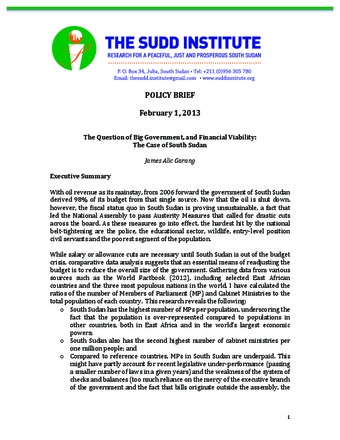
The Question of Big Government, and Financial Viability: The Case of South Sudan
Author: James Alic Garang
Organization: The Sudd Institute
Type: Policy Briefs
Date: 01/02/2013
With oil revenue as its mainstay, from 2006 forward the government of South Sudan derived 98% of its budget from that single source. Now that the oil is shut down, however, the fiscal status quo in South Sudan is proving unsustainable, a fact that led the National Assembly to pass...
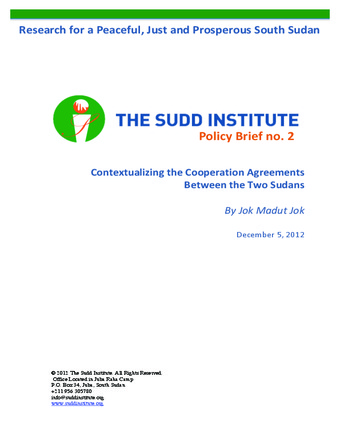
Contextualizing the Cooperation Agreements between the Two Sudans
Author: Jok Madut Jok
Organization: The Sudd Institute
Type: Policy Briefs
Date: 05/12/2012
The recent set of Cooperation Agreements signed in Addis Ababa, Ethiopia between the Two Sudans attempts to resolve many of the so-called "post-referendum issues" between the two countries. The popular reaction to the agreements are mixed.
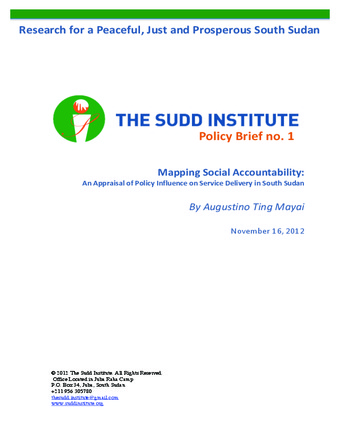
Mapping Social Accountability: An Appraisal of Policy Influence on Service Delivery in South Sudan, 2006-2011
Author: Augustino Ting Mayai
Organization: The Sudd Institute
Type: Policy Briefs
Date: 16/11/2012
How might less-informed policy-making lead to social injustice? How do the Government of South Sudan's budgeting decisions impact the delivery of security, health services, and education at the local level?
